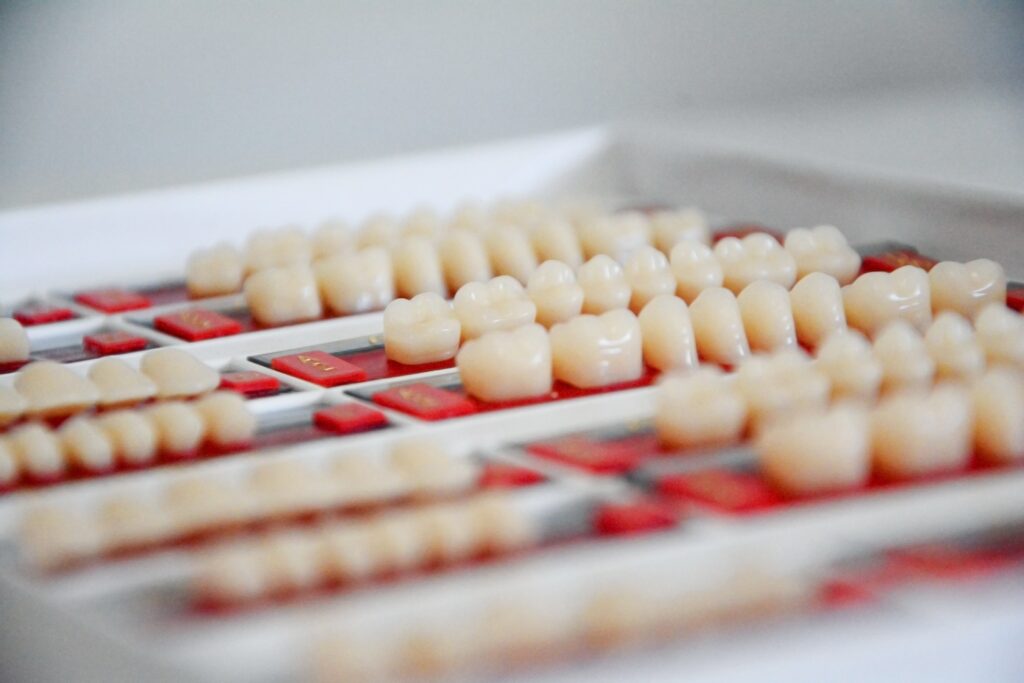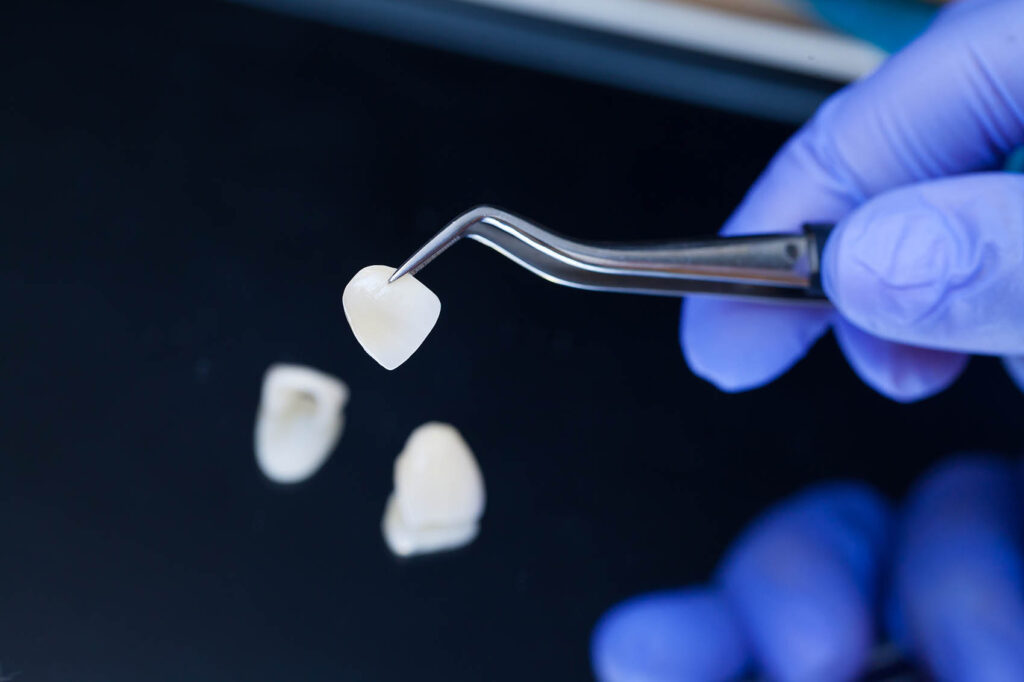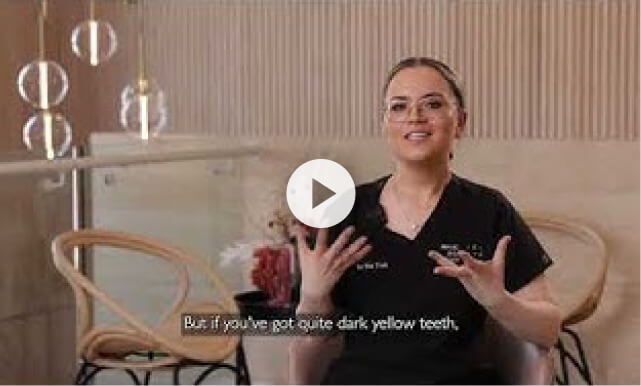A winning smile is the perfect confidence boost in your day-to-day life, and dental veneers can help create this ideal smile. These thin, custom-made shells, are designed to cover the front of your teeth and can work wonders when it comes to fixing a variety of dental imperfections, from discolouration to gaps and misalignment.
Wondering if veneers are right for you? Check out our porcelain veneers before and after page to see the dramatic results. One question that often arises is whether veneers can turn yellow over time. This occurrence is both rare and uncommon fas veneers are known for being colour stable and long-lasting. Their success rate is 99% at 10 years and 80% after 20 years. However, in the 1% of cases, a veneer can change colour and there are several reasons.
We will take a look at factors that can lead to veneer discolouration, and more importantly, how to prevent it. With these handy tips, you can keep your veneers looking their best for years to come.
The Stain-Resistant Properties of Veneers
Dental veneers, particularly those made from porcelain, are well-known for their stain-resistant properties. This is thanks to the high-quality ceramic used, which is both durable and nonporous. This nonporous quality means that it does not readily absorb pigments from food, drinks, or other substances, making it highly resistant to staining.
However, while veneers are designed to resist staining, they are not completely stain-proof. Over time, the glaze on veneers can wear down. Veneers still require proper care and maintenance to keep them looking their best. This includes regular brushing and flossing, professional cleanings, and avoiding habits that can stain or damage your veneers.
Factors That Can Influence Veneer Discolouration
While teeth veneers are resistant to staining, they are not completely sealed. Factors such as the quality of the veneer material, the effectiveness of the bonding process, and your lifestyle habits can all influence the potential for veneer discolouration.
- Quality of the veneer material: The quality of the material used in your veneers plays a significant role in their resistance to staining. High-quality porcelain veneers are highly resistant to discolouration, while composite resin veneers may be more prone to staining.
- Effectiveness of the bonding process: The process of bonding the veneer to your natural tooth is crucial in preventing discolouration. If the veneer is not properly bonded, it can create small gaps where bacteria and staining substances can seep in, leading to discolouration.
- Lifestyle habits: Certain lifestyle habits can contribute to veneer discolouration. These include smoking, and consuming stain-causing foods and drinks, such as coffee, tea, and red wine.
- Oral hygiene practices: Failing to brush and floss regularly can allow plaque and tartar to build up on your veneers, leading to staining. Using a non-abrasive toothpaste and a soft-bristled toothbrush can help maintain the colour of your veneers.
- Ageing process: Over time, veneers, like natural teeth, can change colour due to the natural ageing process. This is often a gradual change that may not be immediately noticeable.
Proper Care and Maintenance of Veneers
Maintaining the colour and integrity of your veneers involves more than just regular brushing. It’s important to follow a comprehensive care routine, including regular dental check-ups, professional cleanings, and avoiding habits that can damage your veneers.
Dental Hygiene Practices for Long-Lasting Veneers
Good oral hygiene is extremely important. This includes brushing twice a day with a soft-bristled toothbrush, flossing daily, and using non-abrasive toothpaste.
Avoiding Staining Substances and Habits
Certain foods, beverages, and habits can stain your veneers over time. These include coffee, tea, red wine, tobacco products, and excessive alcohol consumption. Moderation is key! This can also lead to a darker discolouration of your veneers, with many wondering why veneers turn black.
Professional Cleaning and Polishing of Veneers
Regular professional cleanings can help maintain the colour and shine of your veneers. Your
dentists can also polish your veneers to remove any surface stains and restore their original shine.
Addressing Yellowing or Discolouration Concerns
If you notice your veneers turning yellow, it’s important to have a chat with your dentist. They can assess the situation and recommend the best course of action, which may include polishing or replacing the veneers.
Tips for Maintaining Veneer Whiteness
Maintaining the whiteness of your veneers involves a combination of good oral hygiene, healthy lifestyle habits, and regular dental care.
Why Veneers Change Colour
Veneers can change colour due to a variety of factors, including the quality of the veneer material, the effectiveness of the bonding process, exposure to staining substances, and the natural ageing process.
Caring for Veneers
Caring for your veneers involves regular brushing and flossing, avoiding staining substances, and scheduling regular dental check-ups. It’s also important to treat your veneers with care to avoid chipping or damaging them.
- Use a Soft-Bristled Toothbrush: When brushing your veneers, use a soft-bristled toothbrush. Hard bristles can scratch the surface of your veneers, leading to dullness and potential staining.
- Review Toothpaste Ingredients: Not all kinds of toothpaste are safe for veneers. Avoid those with abrasive ingredients that can scratch the veneer surface. Your dentist can recommend a safe and effective toothpaste for maintaining your veneers.
What Leads To Staining Veneers?
While veneers are designed to be resistant to staining, certain habits and lifestyle choices can lead to discolouration over time. Let’s explore some of the common factors that can contribute to staining veneers.
Smoking Cigarettes and Other Tobacco Products
Tobacco products, including cigarettes, cigars, and chewing tobacco, contain tar and nicotine, which can cause significant staining. These substances can stick to the surface of your veneers, leading to a yellow or brown discolouration over time.
Drinking Coffee
Coffee is a major culprit when it comes to staining veneers. The dark pigments in coffee can accumulate on the veneer surface, leading to yellow or brown discolouration. While it’s not necessary to completely eliminate coffee from your diet, it’s a good idea to rinse your mouth with water after drinking coffee to help prevent staining.
Consuming Red Wine
Red wine, much like coffee, contains dark pigments that can stain your veneers. The acidity in wine can also erode the glaze on your veneers, making them more susceptible to staining. As with coffee, consider rinsing your mouth with water after drinking red wine to help prevent discolouration.
Not Limiting Soda Intake
Soda, particularly dark-coloured varieties, can stain your veneers. The high sugar content in these drinks can also contribute to tooth decay, which can affect the appearance of your veneers. Limiting your intake and opting for water can help maintain the colour of your veneers.
Failing to Schedule Professional Teeth Cleanings Twice a Year
Regular professional cleanings are crucial for maintaining the colour and shine of your veneers. Your dentist can remove any plaque or tartar buildup and polish your veneers to remove surface stains. We recommend scheduling a professional cleaning at least twice a year.
Whiten My Veneers
If you’ve noticed your veneers losing their brightness, here are the steps you can take to maintain their colour.
Can Veneers be Whitened?
Unlike natural teeth, veneers cannot be whitened using traditional teeth whitening methods. This is because veneers are made from materials that are resistant to the bleaching agents used in whitening products. If your veneers have discoloured, it’s best to chat with your dentist about the possible solutions. These may include polishing the veneers, or in some cases, replacing them with new ones.
Book a Veneers Consult
If you’re concerned about the colour of your veneers, don’t hesitate to reach out to our team at Dental + Skin Clinic. During a consultation, we can assess the condition of your veneers, discuss your smile transformation goals, and recommend the best course of action. Whether it’s polishing or replacing your veneers, we’ll help you find that winning smile.



